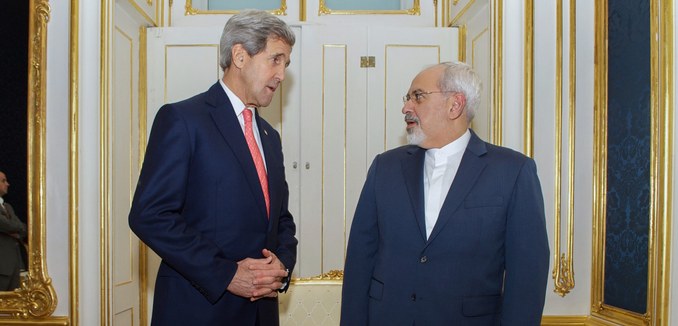Attempts by the administration of President Barack Obama to downplay the significance of Iran’s seizure of two American naval boats and their crews on Tuesday underscore the degree to which the nuclear deal with Iran holds the president’s foreign policy legacy hostage, Josh Rogin and Eli Lake wrote in an analysis for Bloomberg View on Tuesday.
Rather than demonstrating the benefits of diplomatic engagement with Iran, the seizure of the two vessels shows that the Islamic Revolutionary Guard Corps had the audacity to “board U.S. vessels, take American soldiers into custody, and … confiscate the crew’s communications and GPS equipment,” they argued.
Rogin and Lake also challenged officials’ claims that the seizure showcased the good working relationship between Secretary of State John Kerry and Iranian Foreign Minister Mohammad Javad Zarif, writing that the incident conversely shed light on the tensions between the White House and Tehran. For instance, while Iranian state media claimed that the sailors were “arrested” for “snooping,” the administration told reporters that one or both of the boats had mechanical difficulties. The captive sailors were also not permitted to contact their commanders for several hours.
In recent weeks, Rogin and Lake pointed out that the administration sought to placate Iran by promising to issue visa waivers for travelers who had been to Iran– despite a new law requiring such travelers to apply for visas– and delaying sanctions over the regime’s illicit ballistic missile program indefinitely.
Aaron David Miller, a former State Department official, observed that the “administration is going to remain hostage from now until they leave office to the games the Iranians play and to Iranian behavior that falls outside the four corners of the agreement.”
According to Rogin and Lake, the administration’s reaction to the incident, which included downplaying its significance while seeking to mollify Iran, “is becoming the norm in the U.S.-Iran relationship in the wake of the Iran deal, even as Iran escalates tensions with the U.S. and its allies.”
James Jeffrey, a former U.S. ambassador to Iraq and now a fellow at the Washington Institute for Near East Policy, said, “The problem is, all indications are that the Obama administration is changing its overall approach to Iran, not standing up for its own rights.” Jeffrey explained, “A lot of it is, ‘This is our legacy,’ and ‘We can’t let anything get in the way of it.’”
Jeffrey added that Iran is taking advantage of the administration’s commitment to preserving the nuclear deal in order to engage in provocative behavior without fear of consequences.
The administration’s increasing deference to Iran has not only been evident in bilateral relations, but also in the broader diplomatic sphere. Rogin and Lake observed recently that the White House’s refusal to criticize Iran in its recent escalation of tensions with Saudi Arabia demonstrated a marked tilt towards Tehran, which Riyadh and other American Gulf allies were paying close attention to.
[Photo: UNVIE U.S. Mission To International Organizations in Vienna / Flickr ]




